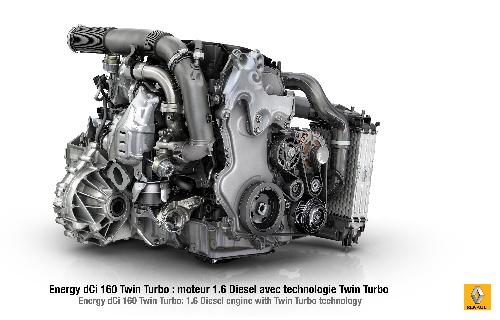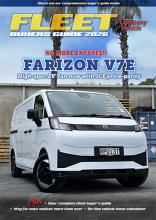As a successful engine maker in the world of F1, Renault makes full use of its experience by continuously refining the energy efficiency of its road car engines to deliver even greater driving enjoyment. The latest fruit of the firm’s downsizing strategy is the Energy dCi 160 Twin Turbo, the first 1.6-litre diesel powerplant to benefit from twin-turbocharging.
This 1,598cc block delivers 119kW and a generous 380Nm of torque, which catapults it into the domain of 2-litre engines in terms of performance. This important breakthrough combines with fuel consumption and CO2 emissions savings of 25 percent.
Improved performance courtesy of twin-turbocharging expertise.
The use of “Twin Turbo” technology for this diesel engine ensures a blend of low-end torque and high power at higher revs, the obvious knock-on effect of which is enhanced driving enjoyment.
The system comprises two sequential turbo-compressors:
• The first is a very low inertia turbo which provides high low-end torque for crisp pull-away and mid-range acceleration. To guarantee sprightly pick-up response at low revs and incisive acceleration, 90 percent of peak torque is available from 1,500rpm.
• The second turbo assumes the reins at the higher-end and produces high power (100bhp/litre) at faster engine speeds to ensure smooth, linear, dependable acceleration right the way up to maximum revs.
The engine always works within its range of optimum efficiency, which naturally yields benefits in terms of fuel consumption and CO2 emissions.
This expertise in the field of sophisticated turbochargers is not the only link between the 1.6-litre Renault Energy F1 Power Unit and the Energy dCi 160 Twin Turbo block which takes advantage of a number oftechnologies borne out of Renault’s know how in F1, notably in terms of cooling and friction reduction:
• The transverse water flow system permits faster and more efficient cooling of the combustion chamber.
• ‘U’-section U-Flex piston rings adapt to changes in the form of the cylinder walls resulting from fluctuations in temperature and pressure to yield the optimum compromise between efficiency and friction.
• DLC (Diamond Like Carbon) super-finishing of the cam followers also reduces friction.
The fuel injection system of the Energy dCi 160 Twin Turbo operates at a pressure of 1,800 bar to function with the twin turbocharger. It complies with Euro 6b emissions legislation and incorporates a NOx Trap and particulate filter regeneration system.
By dint of its efficiency, this engine is comfortably capable of powering larger vehicles, and will notably be available for Renault’s forthcoming D- and E-segment models.



